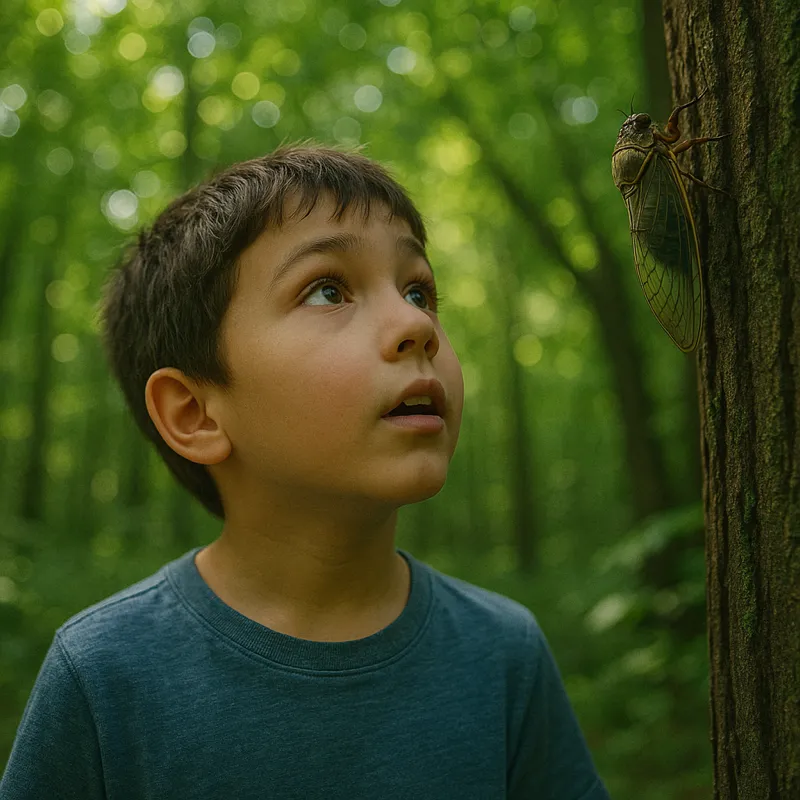The other day, I went for a walk with my 8-year-old son. Maybe that will qualify this for #wednesdaywalk hosted by @tattoodjay.

Image generated by ChatGPT
We hadn’t even made it to the corner when the questions began:
- “How do mushrooms grow?”
- “Do they grow on paint?”
- “What else do they grow on?”
- “Why do people walk?”
- “What’s that sound?” (He meant the chirring insects in the trees.)
- “Why are there so many squirrels in America but no squirrels in Japan?”
- “Why are there so many cicada?”
- “Why is ice cream so good?”
- “Why is summer so hot?” (It was around 40℃/104℉ with 90% humidity on this day)
And on and on it went.
The questions came in bursts, overlapping, with no filter or embarrassment. He wasn’t trying to sound smart. He wasn’t trying to impress me. He was genuinely wondering, and so he asked.
And you know what? It was wonderful.
All Questions Are Good Questions
Somewhere along the way, most of us get taught — subtly or directly — that asking questions is something to be ashamed of. I know that was true of me. I think it is less true today than it was for Generation X as we try to correct some things for our kids, but it is still true enough. We learn to avoid raising our hand unless we’re sure we’re right. We start to believe that not knowing something is a flaw. Worse, we assume that others will think less of us for asking. That cute girl in the second row might laugh at us if she finds out we don’t know the answer.
But the truth is:
There is no such thing as a stupid question.
I know, that’s almost a cliché at this point. And we all have heard many questions that sure do seem pretty stupid coming from adults, but even the seemingly dumb ones — if made earnestly and not as a joke — are good questions. Every question, at its core, is an act of curiosity. It’s a bid for understanding. And that’s something to celebrate, not shut down.
Even the ones that sound silly — “Do mushrooms grow on paint?” — deserve a real answer. A real answer, not a dismissive one. No, they don’t, but mushrooms are incredibly adaptable. They can grow on all kinds of strange surfaces, depending on moisture and nutrients. Some even grow on walls if the conditions are right.
Kids don’t know where the “boundaries” of acceptable questions are. They haven’t yet absorbed the shame of “you should already know that.” We should avoid teaching them that shame. Society will unfortunately teach them that negative lesson soon enough, but at least frm family they should never hear it.
This also makes them great teachers for us.
Don’t Dumb It Down; Just Make It Clear
When my son asks me something like “Why are there so many cicada?”, I do my best to give an honest answer.
Not a fake answer. Not a “go ask your mother.”
And not a baby version, either.
Believe me, I’m not perfect, Sometimes I’m tired and I just want to enjoy the quiet and being with him and my first impulse is to say anything to get him to be quiet.
But I stop myself. And force myself to give a more thoughtful answer.
I might say something like:
“Well, because the humidity and heat of Japan is perfect for them to thrive, there are lots of the kind of trees they like, and many parks where they can grow underground.”
I don’t say “They just like it here.” I don’t say “Because there are.”
If I don’t know something, I say that too. I don’t want for that to sound dismissive, so I then suggest we look it up. I try to model the idea that not knowing is not only okay — it’s the first step toward knowing. You can’t know something without not knowing it first and then asking why.
Adults Need This Too
The older I get, the more I believe this:
You don’t stop learning when you become an adult. You only stop learning when you stop asking.
When was the last time you let yourself ask a basic question? When was the last time you looked something up just because it puzzled you?
I do everyday! I try not to let a day go by without learning something new.
We live in a time when answers are everywher, but only if we’re bold enough to ask the questions first. Hell — these days it doesn’t even require boldness; just ask ChatGPT and you will more than likely get a pretty decent answer, one you can follow up on by reading Wikipedia, which will also give you a pretty decent answer in most cases. There is absolutely no excuse!
So take a cue from an 8-year-old. Wonder about everything. Ask what seems obvious. If you worry about people laughing at you, ask ChatGPT. (But also don’t worry about people laughing at you. Who cares what they think?) Follow the thread of your curiosity wherever it goes.
And don’t ever let anyone make you feel stupid for asking.
A Final Note for Teachers and Parents
One thing I’ve learned more than all others, both as a teacher, but also with my kids is this:
Praise the question, not just the answer.
A child who is curious will learn more in a week than a child who only memorizes facts ever will.
If they ask, “Why do people walk?” — don’t laugh.
Start with: “That’s a really interesting question. Let’s think about that…”
If you are tempted for even a moment to think That’s a dumb question then stop yourself and put on your Mr Rogers shoes.
And let the learning begin.
But anyway, I don’t know. Sorry for the lecture. The teacher in me gets away on some of these posts. What do you think — agree, disagree, think I’m totally off my rocker? Let me know in the comments.
❦
 |
David is an American teacher and translator lost in Japan, trying to capture the beauty of this country one photo at a time and searching for the perfect haiku. He blogs here and at laspina.org. Write him on Mastodon. |